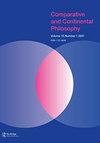Qing (情) Gan (感) and Tong (通): Decolonizing the Universal From a Chinese Perspective Part 2
IF 0.3
0 PHILOSOPHY
引用次数: 0
Abstract
ABSTRACTABSTRACTCartesianism is deified as the mythical beginning of Modern Western Philosophy. This paper draws on evaluations of the epistemology and colonial context of Cartesianism from Latin American philosophers to show how the Cartesian project of universalism has been detrimental to non-Western cultures. In contrast to this exclusionist universalism, this paper provides an alternative model of universalism that is premised on the interaction between embodied particulars. It stresses how, in this Chinese conception of universalism as resulting from feeling (gan, 感) and response (ying, 应), the agent is expected to subdue her own ego and its desire to impose itself onto particulars. This imposition would be an obstruction that impedes the free flow of interactions between particulars and so acts as an impediment to participating in the “universal.” This reconstructed Chinese conception of universalism resonates with Enrique Dussel’s self-reflexive understanding of Modernity and Aimé Césaire’s conception of the universal.KEYWORDS: Qing (情)universalismEnrique DusselCartesianismEdward Saiddecolonial AcknowledgementsMy thanks to Jacob Bender for reading previous drafts of this paper and for his always invaluable input. My thanks also to the editors of this journal David Jones and Jennifer Liu for their help throughout the publication process. My thanks also to the copyeditor for her very insightful edits.Disclosure statementNo potential conflict of interest was reported by the author(s).Additional informationNotes on contributorsShuchen XiangShuchen Xiang is Mount Hua Professor of Philosophy in the department of philosophy at Xidian University, China. She is author of A Philosophical Defense of Culture: Perspectives from Confucianism and Cassirer (SUNY Press, 2021), Chinese Cosmopolitanism: The History and Philosophy of an Idea (Princeton University Press, 2023).青(音)、干(音)、通(音):从中国视角看世界的非殖民化(二)
摘要笛卡儿主义被神化为现代西方哲学的神话开端。本文借鉴了拉丁美洲哲学家对笛卡尔主义的认识论和殖民背景的评价,以展示笛卡尔的普遍主义计划是如何对非西方文化有害的。与这种排他性的普遍主义相反,本文提供了另一种普遍主义模型,该模型以具体细节之间的相互作用为前提。它强调的是,在这种由感觉(gan)和反应(ying)产生的中国普遍主义观念中,主体是如何被期望去征服她自己的自我及其将自己强加于细节的欲望的。这种强加将成为阻碍个体之间互动自由流动的障碍,从而成为参与“普遍”的障碍。这种重构的中国普遍主义概念与恩里克·杜塞尔对现代性的自我反思理解和艾姆斯·卡萨伊尔的普遍主义概念产生了共鸣。关键词:清(义)普世论孟立克·杜塞尔·笛卡儿主义爱德华·赛义德非殖民化致谢感谢雅各布·本德阅读了本文之前的初稿,并一直提供了宝贵的意见。我还要感谢本刊的编辑David Jones和Jennifer Liu在出版过程中给予的帮助。我也要感谢编辑非常有见地的编辑。披露声明作者未报告潜在的利益冲突。作者简介向树琛,中国西安电子科技大学华山哲学系教授。她是《文化的哲学辩护:从儒家和卡西耶的视角》(纽约州立大学出版社,2021年)、《中国世界主义:一种思想的历史和哲学》(普林斯顿大学出版社,2023年)的作者。
本文章由计算机程序翻译,如有差异,请以英文原文为准。
求助全文
约1分钟内获得全文
求助全文

 求助内容:
求助内容: 应助结果提醒方式:
应助结果提醒方式:


